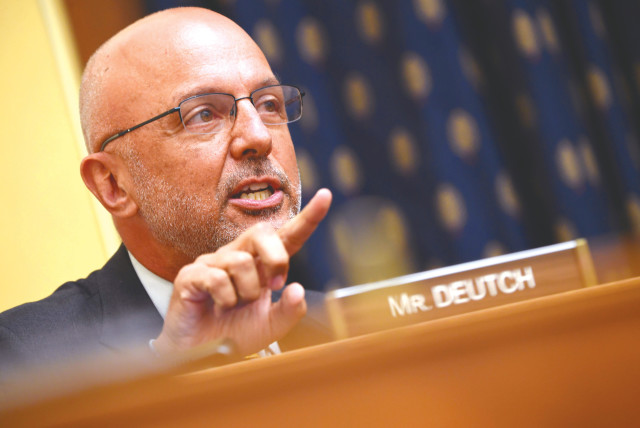American Jewish Committee CEO reacts to new data revealing US Jews feel less safe

Another shocking data point for Deutch was the fact that nearly half of American Jews changed their behavior, either in person or online, for fear of being identified as Jewish and facing antisemitism
A recent study by the American Jewish Committee revealed that over 60% of US Jews felt less secure than the previous year.
The results of the American Jewish Committee’s latest survey didn’t surprise the organization’s CEO, former Florida Democratic Congressman Ted Deutch, but the data still shocked him.
The AJC conducted its annual survey from October 5 – November 21, 2023. Questions were added after October 7 to gauge how the massacre impacted feelings of safety.
Three-quarters of the people surveyed said they feel less safe as a Jewish person in the US as a result of the attacks, AJC’s report on the survey said.
“While large majorities of US Jews have consistently viewed antisemitism as a problem in the United States, 2023 reflects an uptick in the share who hold that opinion. Moreover, the 2023 results show a sharp increase in the share of US Jews who see antisemitism as a very serious problem in the United States,” according to the report. “Likewise, the share of American Jews reporting that antisemitism in the US has increased over the past five years has traditionally been high, but in 2023 it is even higher.”
The fact that AJC now knows that close to 80% of US Jews feel less safe in America is shocking, Deutch said, and the fact that two-thirds of Jewish adults say they feel less secure living in the US than they did last year is also shocking.
“It’s not surprising, because we felt it,” Deutch said. “But it’s shocking to see these data points and to know the impact that this spiraling antisemitism is having on American Jews.”
Another shocking data point for Deutch was the fact that nearly half of American Jews changed their behavior, either in person or online, for fear of being identified as Jewish and facing antisemitism.
According to the survey, roughly six in 10 American Jews have been the target of antisemitism in the past 12 months, and say antisemitism is taken less seriously than other forms of hate and bigotry. Overall, 25% of US Jews say they have been the target of antisemitism by either a physical attack, a remark in person, or vandalism/messaging.
Deutch said that when any part of America feels that way, all Americans should be concerned.
“Not everyone needs to experience antisemitism directly for the broader community to understand that this is a serious problem for all of us,” Deutch said.
But what will it take for next year’s data to look different, and for American Jews to feel safer?
“It is the most important thing for us to be thinking about,” Deutch said. “The fact is that the challenge that we have now is to ensure that everyone steps up to fight antisemitism, to fight against this Jew-hatred that has raged across America.”
It will take university presidents standing up to faculty members and students who celebrated the massacre on October 7 and business leaders acknowledging that every country has the right to defend itself, Deutch said. It will also take government officials, starting with the White House through Congress, down to every city and county, acting to fight antisemitism, because they know that the community is at risk when all of those things happen.
“Then next year, the Jewish community will feel more secure living in America. That’s the way it should be,” Deutch said. “And that’s the data that we’ll be looking at a year from now.”
Deutch thinks it’s realistic for this to happen, though he said he knows it seems right now things are heading in a terrible direction.
There are more people in the Jewish community proudly and defiantly standing up to this antisemitism, according to Deutch. The defiance and unity that the community is showing can’t change, Deutch said.
“We’re not backing down,” Deutch said. “This is a battle to protect the Jewish community, not just at this moment, but for our future here in the United States.”
Jerusalem Post Store
`; document.getElementById("linkPremium").innerHTML = cont; var divWithLink = document.getElementById("premium-link"); if (divWithLink !== null && divWithLink !== 'undefined') { divWithLink.style.border = "solid 1px #cb0f3e"; divWithLink.style.textAlign = "center"; divWithLink.style.marginBottom = "15px"; divWithLink.style.marginTop = "15px"; divWithLink.style.width = "100%"; divWithLink.style.backgroundColor = "#122952"; divWithLink.style.color = "#ffffff"; divWithLink.style.lineHeight = "1.5"; } } (function (v, i) { });

